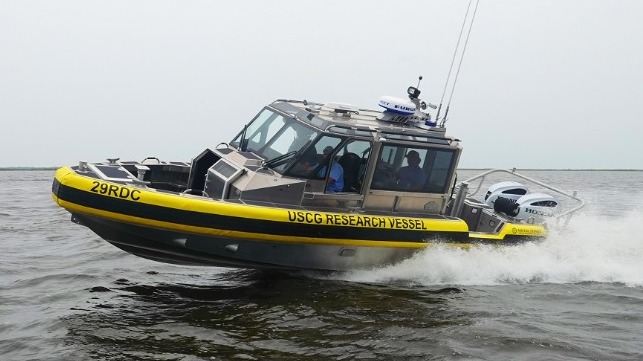U.S. Coast Guard Orders Autonomous Boat for Testing

Last month, the U.S. Coast Guard issued a request for comment on possible regulatory changes regarding the development of autonomous maritime systems. As it makes moves to change the rules for commercial users, it has purchased its own small autonomous vessel for internal testing.
The USCG's Research and Development Center (RDC) has ordered a new "Sharktech" autonomous test vessel from Louisiana-based shipbuilder Metal Shark and Boston-based autonomous technology developer Sea Machines. The aluminum 29-foot patrol boat is built on the same hull platform as the service's familiar Response Boat – Small (RBS-II), but this unit is fitted with the Sea Machines SM300 autonomous command and remote-helm system. According to Metal Shark, it is capable of transit autonomy, collaborative autonomy, active ride control, collision avoidance, and remote control vessel monitoring.
The RDC is the Coast Guard's primary research arm, and it helps to bring new technologies into the USCG’s operational forces. During exercises scheduled for October off the coast of Hawaii, the RDC team will test and evaluate the vessel’s suitability for USCG surveillance, interdiction, patrol and other missions. The new vessel will then be homeported at the RDC’s facility in Connecticut.
“We are committed to the advancement of autonomous technology, through our relationships with leading autonomy suppliers as well as through our own R&D, and we are engaged with multiple customers, from the USCG, the Department of Defense, and commercial operators," said Metal Shark CEO Chris Allard. "With this latest delivery, Metal Shark is proud to play a role in the Coast Guard’s autonomous technology R&D efforts.”
The new boat will give the Coast Guard its own internal experience with vessel autonomy as it contemplates rule changes for autonomous commercial systems. On August 11, the service released a request for input from industry on how existing statutes or regulations present a challenge for autonomous vessel development, including testing and operational deployment. According to Commandant Adm. Karl Schultz, the Coast Guard is also looking to learn more about how autonomous systems may require changes for mariner training, port facilities, infrastructure or security measures.
